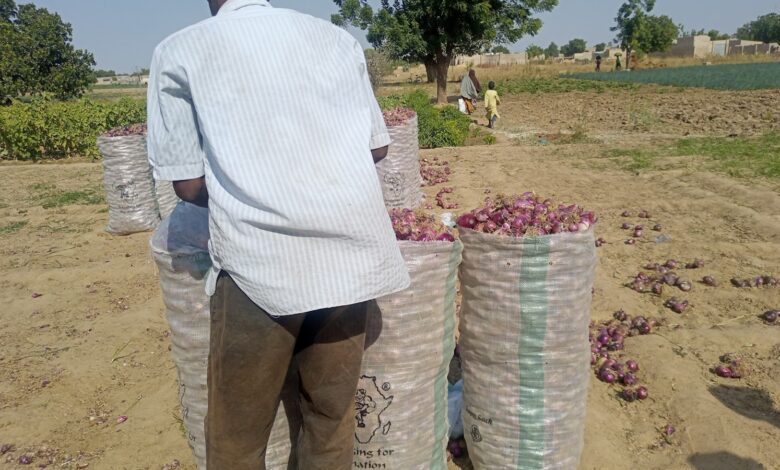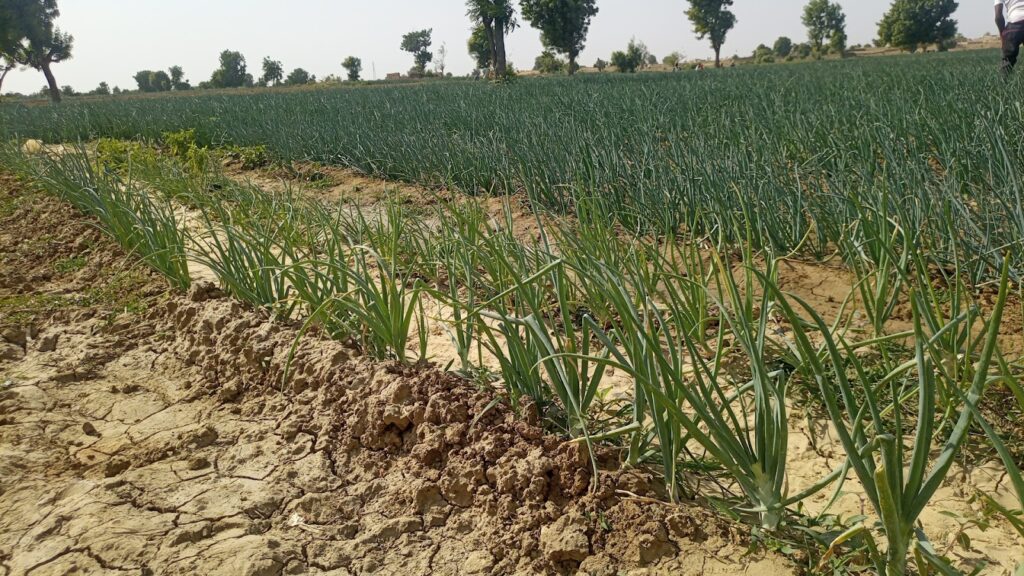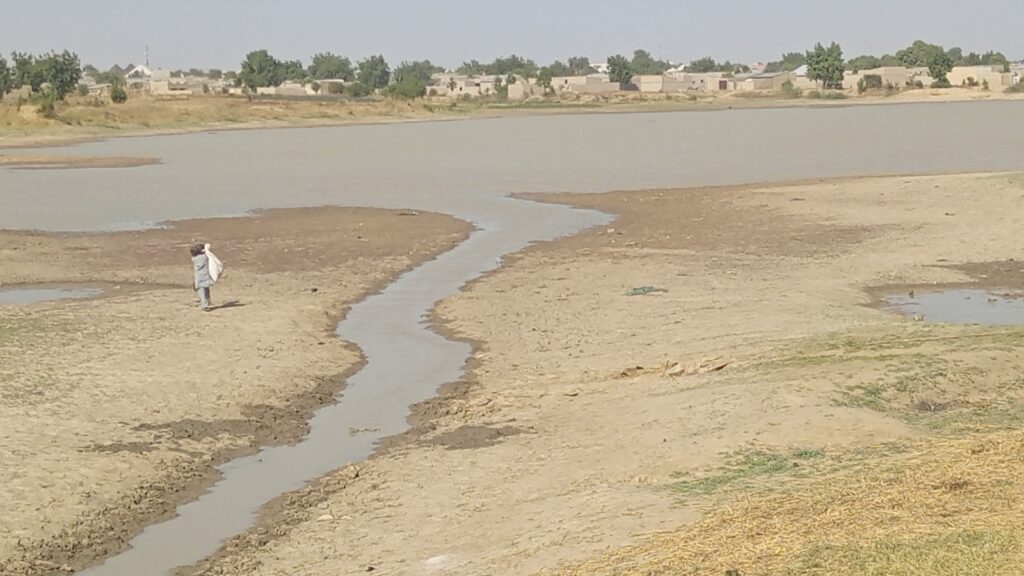Life Tough Under Insurgency For Borno Vegetable Farmers, But They’re Not Giving Up
The decade-old Boko Haram Insurgency has taken its toll on the lives of farmers who no longer have access to lands to cultivate their crops. But some take risks to keep body and soul together.

It was late noon and Yahaya Ibrahim, 31, was racing against time to fill sacks with onions freshly harvested from his farmland near River Gadabul at the extreme outskirts of Maiduguri, Northeast Nigeria.
He had two more sacks to fill up before the dark hours descended on the neighbourhood.
Some of his workers had since left the vegetable farmlands after playing their role by carefully harvesting the balls of onions from 8:00 a.m. to 1:00 p.m. Their take-home was ₦1,000.
“I have to retain one other hand to help me quickly sack the onions before we transport them home,” said Ibrahim.
The plot of land where he farmed the onions was not more than a quarter of a hectare. But the harvest was good. Ibrahim’s is not the only farmland. Many other vegetable plantations spread along the bank of River Gadabul. Though it is already the harmattan season, the farms kept the entire area lush.
“We can only squeeze ourselves to cultivate tiny plots along this side of the river because it is still very dangerous crossing to the other side,” he said.
Before now, the location was prone to attacks by Boko Haram. Many straying residents and Internally Displaced Persons (IDPs) from the nearby Bakassi Camp have either been killed, maimed, or taken hostage by the insurgents.
River Gadabul stretches from Maiduguri to the Molai axis along the dreaded Damboa-Maiduguri highway that leads to Biu in southern Borno.

Many vegetable farmers had lost their main source of income due to the continued hostility and occupation of the hinterlands by Boko Haram.
Farmers, who were displaced by the terror group from remote rural areas, lost their livelihood as they fled to Maiduguri, the Borno state capital, where there isn’t enough land for crop production. Similarly, the farmers originally from Maiduguri, too, have no access to farmlands beyond a kilometre or less away from the troubled city.
“There is a serious land tenure issue now which was nonexistent before the Boko Haram crisis. So a little piece of land is now like a gold mine to a serious farmer. I paid three times the money required to acquire this tiny plot of land where I planted onions,” said Ibrahim.
“Before now, we used to travel as far as Damboa and Biu farming areas to rent land to plant onions, pepper, tomatoes and carrots. But who dares that now? Everywhere is unsafe.
“Though my family and I are not displaced, the insurgency took a huge bite on our resources as well as livelihood. There was a time when I was jobless for about two years due to the hostile activities of Boko Haram. I had to migrate to Jigawa and Nasarawa state to cultivate my crops. It’s been tough in the past years.”
Bakura Adam, another farmer near the Gadabul river, said though they are not displaced, the restrictions to movement have rendered them hungry. Adam, who said he had finished harvesting the little plot of onion, was seen preparing the land for yet another planting — of watermelon.
“We have to optimally utilise the land because we rent it for a whole year and what we get as yield is small due to the size of the land. So we have to continue to grow different types of crops as much as the weather and water source permit us,” he explained.
The farmers said they often used pumping machines to draw water from the river to wet the farmland and the crops.

Ibrahim disclosed that some farmers have migrated completely from Borno to safer locations in Bauchi, Jigawa, and Yobe states. “But we cannot just give up on our families. That is why we are risking our lives to be here,” he added.
The young farmer said despite the difficulties, the harvests are as good as the market.
“We are selling a full bag of this type of onion for ₦18,000 compared to the past when it was sold at ₦5,000,” he said.
The riverbank farming sites have not only contributed to the food needs of the people of Maiduguri, they are also creating chain benefits. Women especially were also sighted in the farming areas as they went there to buy onion leaves.
“We buy the leaves to also sell in our neighbourhood,” said Amina Yakubu, an IDP who has now settled in a host community not far away from the riverbank.
Farming has been a mainstay of Borno’s economy, contributing up to 65 per cent of the state’s Gross Domestic Product. But when Boko Haram struck 12 years ago, most of these economic assets and sources of revenue gradually depleted until most of the farmers were forced into IDP camps or restrained from gaining access to farmlands.
A report released in Aug. 2021 by the United Nations Office for the Coordination of Humanitarian Affairs (OCHA) indicated that “northeast Nigeria is on the brink of catastrophic hunger” due to reduced food production activities in the subregion, especially in Borno. While an estimated 4.4 million people still struggle to feed, about 775,000 people face an extreme risk of starving — the worst outlook in four years.
The state government had in 2020 supported the Agro Rangers scheme which assigned armed security personnel, led by the Nigeria Security and Civil Defense Corps (NSCDC), to watch over local farmers in mega farm locations.
Despite that effort, Boko Haram terrorists still disturbed some of the farm locations along with the Zabarmari suburb of Jere Local Goverment Area (LGA), where they massacred over 100 farmers in cold blood in Nov. 2020.
Governor Babagana Zulum said his government would continue to provide more resources to the Agro Rangers to continue to provide security to farmers around Maiduguri and some safe locations in the hinterlands. The Northeast Development Commission (NEDC) had recently organised security training for the personnel, whom it later provided with non-ballistic security kits like life vests and helmets.
Support Our Journalism
There are millions of ordinary people affected by conflict in Africa whose stories are missing in the mainstream media. HumAngle is determined to tell those challenging and under-reported stories, hoping that the people impacted by these conflicts will find the safety and security they deserve.
To ensure that we continue to provide public service coverage, we have a small favour to ask you. We want you to be part of our journalistic endeavour by contributing a token to us.
Your donation will further promote a robust, free, and independent media.
Donate HereStay Closer To The Stories That Matter




